- Home
- J. T. Edson
The Texan Page 2
The Texan Read online
Page 2
“Johnny boy,” the girl said, “you’ll get bad trouble, if you don’t watch what you’re doing.”
The blacksmith scowled. “I’m tired of Benjy Vent hanging round you all the time—and of that bunch at the saloon insinuating that your father started the fight with Vent. I’ve told them that, if I hear it said again, I’ll beat hell out of them.”
“Then Barry Vent or Slingo Witch will kill you.” The girl’s voice was tender and gentle. “Leave them alone, Johnny. It isn’t worth getting killed over.”
Johnny Sinclair looked down at the pretty face—for Jean Mollison was a very pretty girl. Her face had never felt the touch of any make-up and was fresh, tanned and faultless. From her dainty shoes to the top of her brunette head, she was a sight to make a man look twice, even in that old gingham dress. The blacksmith towered over her, a big man wearing a sleeveless shirt, levis and a thick leather apron which showed his business in life.
He wanted to change the subject, but he wasn’t a good conversationalist and wasn’t sure how to go about it. The girl was over the worst of her grief at her father’s death, but he did not wish to keep reminding her of it. The young cowhand was almost to the corral rail by then. Johnny watched him for a moment.
“I wonder if it’s him,” he said thoughtfully, then shook his head. “No, it couldn’t be—this town doesn’t have that kind of luck.”
“Isn’t who?” she asked.
“No, not alone it wouldn’t be?’ Johnny was not speaking to Jean, he was deep in his own thoughts. “I’d best get back to the forge and do some work.”
Jean was used to Johnny Sinclair’s ways and took no offence at his sudden departure. She smiled and shook her head as she watched him walk away, then said to herself, “It’s nice to know someone cares.”
The door of the house opened. Pop Howard came out, then ambled towards her. She noticed he was giving the newcomer the same attention Johnny had used on him. He stumped over to her and asked: “What did Johnny want?”
Jean watched the young man swing down from his saddle at the corral before she answered: “Just warning me to beware of gambling men with brothers who need a good spanking.”
“Sure—and one day Johnny’ll do it,” Pop growled. He gazed at the youngster, who was standing by his paint and looking at the other horses in the corral, “I wonder if it is him?”
“You’re the second to say that. Who do you mean?”
“Dusty Fog?”
Jean stared at her grandfather for a moment before she saw what he meant. The Rio Hondo gun-wizard, Dusty Fog, rode a paint stallion and toted twin guns in border-draw holsters. All too often, she’d heard about this famous, fabulous Texan. How, in the War Between The States, he’d been the equal of the Dixie guerilla champions, John Singleton Mosby and Turner Ashby. Since then, he’d got a reputation as being the equal of such exponents of the art of ‘triggernometry’ as Wes Hardin, King Fisher, Ben Thompson and other wizards of the tied-down holster.
All she’d ever heard of Dusty Fog did not fit with this small young man in the faded clothes. This small, insignificant, unassuming-looking youngster was far from being what she imagined in a man with a reputation like that of Dusty Fog. She looked at those two white-handled guns and remembered the matched brace of gold-mounted guns Dusty Fog had won at Tombstone in the Cochise County Fair shooting match. The Rio Hondo gun-wizard would be wearing those guns, and this man was not.
“He’s certainly trying to prove he is,” she replied. “Is it him?”
“Never saw him but once, when he was about three year old,” Pop answered. “But all the Fog clan were tall men. Dusty’s pappy tops six foot. That boy ain’t him at all.”
They crossed the open space and the young man turned to greet them. His hat came off as he saw the girl.
“Mind if I leave the hoss here for a spell, friend?” he asked, his soft voice, a pleasant Texas drawl. “Happen for a week or so. Need a place to sleep, too.”
“Leave the horse either in a stall, or at the corral. We’ve a spare room you can take if you like,” Jean put in, before her grandfather could speak. She wanted to prevent this young man from going to the Vent bar; for, if he did, Slingo Witch might think he was Dusty Fog and would certainly kill him.
“Suit me fine, ma’am,” the Texan answered. “I’ve been sage-henning for a week now and a man gets tired of his own fixings. You don’t have a white, blood-bay and a paint here?”
“No. Would it bother you if there had been?” Jean remembered that Dusty Fog’s two inseparable friends, Mark Counter and the Ysabel Kid, rode a blood-bay and’a white respectively.
“It surely would, ma’am.” The Texan’s grin made him look even more boyish than before. “I’ll fix my hoss, then get my gear to the room.”
The young man loosened the clinches and worked the saddle for a time, then swung it free. He must have been far stronger than he first gave the impression of being, for he handled the heavy rig with no trouble. He stood with it over his shoulder and looked again at the other horses in the corral.
“I reckon the stall would be the best thing for us, ma’am. This ole paint of mine doesn’t take to company. He’s real mean with any strange horse.”
“All right,” she answered. “I’ll show you the stalls. Come with me.”
The paint walked behind its master like a huge hound-dog and Jean led the way to the stalls. Inside the building, she watched him send his horse into one and follow it, to strip off the bridle. He avoided a nip from the paint’s teeth with an easy skill which showed he knew the horse well.
“Danged fool ole goat!” he scoffed. “Don’t you ever learn?”
The girl watched the Texan with some misgivings. This youngster could not be the famous Dusty Fog, and most certainly should not be pretending he was. She looked at the gun-belt and the horse; they were not, what one might expect a youngster like this to be wearing, nor owning.
“We’ve a burro in the lean-to if you like to leave your saddle there,” she remarked as he dropped the bar of the gate behind the paint.
The Texan followed her again, carrying the saddle over his shoulder. In the lean-to was a small wooden structure like the roof of a house. Over this, he hung his saddle—for no cowhand ever liked leaving it on the ground. If he did, he would lay it carefully on one side, never standing it on its skirts. However, the saddle was far better kept on a wooden burro.
He unstrapped the bed-roll and pulled the carbine from its boot, then followed the girl out of the building. Pop ambled over to the stall and looked at the big paint, trying to read the brand. The horse was still shaggy with winter coat and be could not see the tell-tale mark on it, so he reached over to touch. The stallion snorted and came round with wicked teeth bared. Pop drew back his hand; he knew horses and knew better than to interfere with this one.
They went across the yard and entered the small, clean house. None of them spoke as Jean led the young man upstairs and into the small side room. She looked around; the bed was laid ready and there was a small table by it with a water jug. In the corner, was a small washstand; the Texan looked towards this and rubbed his band over his bristle-covered jaw.
“What did you say your name was?” she asked.
“Dusty,” he answered, then stopped himself before he said the second word.
She looked hard at him for a moment. Then she turned and walked out of the room, to come back with a pitcher of hot water. He’d laid his carbine on the floor in the corner of the room and his bed-roll lay open on the floor. He looked at a photograph on the wall and asked: “Your pappy?”
Jean nodded and bit her lip as she looked away. The young man didn’t say another word about it as he took the water and poured it into the bowl. She left the room, then opened the door and looked in again.
“The meal will be ready when you’ve washed up,” she said and was gone.
The Texan watched the door close, and smiled. Then he spoke softly to himself. “You don’t believe me, I reckon. Bes
t keep it that way and I’ll surely win that bet.”
He removed the gun-belt, laying it carefully on the bed, then stripped off his shirt and started to wash up. He was shaving, holding the razor in his left hand, when hoof-beats in the street attracted his attention. He went to the window, leaving the razor on the table. Coming back, he took the razor up with his right hand to continue shaving.
Pop Howard watched the girl come downstairs, and asked:
“Who is he?”
“A cowhand called Dusty,” she replied.
Pop grunted. “You reckon he is Dusty Fog?”
“Of course not!” Jean was firm on that; a small, insignificant young man like that one could not possibly be the Rio Hondo gun-wizard. “He isn’t wearing those gold-mounted guns he won at Tombstone. And he rarely goes alone—the Ysabel Kid and Mark Counter are nearly always with him.”
“Guess that’s right. Way he asked about those three hosses made me wonder. I bet he’d have left town if they’d been here.”
The girl’s pretty face showed worry as she glanced at the top of the stairs. “Grandpop, we have to get him out of town. Trying to make folk think he’s Dusty Fog will get him killed. If Slingo Witch thinks he’s Dusty Fog, he’ll be after a fight. Even if that doesn’t happen, one day the real Dusty Fog will catch up with him and do it.”
Pop nodded in agreement. “Damned fool young button!” he growled. “He looks like a real nice kid.”
The ‘fool young button,’ all unaware of the interest he was causing downstairs, and of the fate foreseen for him, finished shaving. He washed his face, dried it and dressed again, then swung his gunbelt on and went downstairs. He looked even younger now, shaved and washed, his hair combed tidily, Jean was reminded of a little boy, fresh tidied up and going to a party.
He followed them into the small dining-room and took the chair she indicated. Jean fetched in the food and served it out. She watched the two men eat, then took her own meal. She did not speak until they had finished the food and were drinking the coffee, Looking across the table she asked: “Are you Dusty Fog?”
There was a slight pause. Then he nodded. “Sure am.”
“Where are Mark Counter and the Ysabel Kid?” she went on.
“We split up for a spell,” the Texan replied, ignoring the breach of frontier good manners.
The girl glanced down at the table; she did not want to pry, but was trying to show the youngster that they knew he couldn’t be Dusty Fog. “Those aren’t the guns you won at Tombstone, are they?”
The Texan shook his head; he noted the looks the girl was giving him. He’d seen that expression before, given by his own womenfolks. It meant: ‘You aren’t fooling me one little bit.’
Looking down at the tablecloth, to hide his grin, he answered, “Why no, they aren’t. I don’t tote them much at all.”
For, a long moment, Jean sat in silence, watching the young man. Then she said: “A man could get himself hurt, being called Dusty Fog.”
The Texan looked back just as gravely, “Ma’am, you’re so right about that. It happens most all the time.”
The girl sighed; she’d hoped their guest would tell her the truth, and had even offered the olive branch to give him a chance to make his peace. She could go no further in the matter, without giving serious offence. Already she was well and beyond the bounds of frontier conversation.
“Will you be staying here for long?” she asked.
“Only until my amigos catch up with me. We aim to head down to Apache Country. Hear tell they’re fixing in to hold a county fair, and I want to earn me some money,”
“Shooting?”
“Trimming horses.”
Pop looked up; he’d never heard of Dusty Fog trimming bad horses—even though he was known as a tophand at all branches of cattlework. “Got me a dun out there that needs trimming some.”
Jean was wondering if the young man could pay for his room; but, before she could suggest that he worked for his keep, he solved the problem by taking money out and paying for a week. There was still a reasonable-sized roll left when he’d paid, and she decided he was the son of a well-to-do rancher who was travelling around for a holiday. That would account for his expensive hat and boots, and for his owning that magnificent stallion.
Pushing back his chair, the young man said, “I’ll give him a whirl, if you like. I saw it in the corral; fair piece of hoss-flesh.”
The two men left the house and Jean cleaned up then went out to watch them. The Texan had caught the dun and got it blindfolded; they were saddling it, and she watched him work. He knew horses very well, she could see that from the way in which he handled the dun, both during the saddling and after he got afork and removed the blindfold. The dun was only half-broken and went wild with rage at feeling a rider astride him again. The young Texan took the conceit out of that dun in big, solid chunks, and when he swung down, the horse knew that at least one man was his master.
“Like I said,” the Texan remarked as he joined Pop outside the corral. “That’s what a man’d call a fair piece of hoss-flesh. Got a whole heap of sand and he’ll likely make a good sale.”
“Will now he’s been rid. But I never thought to get rid of him,” Pop replied as he watched Jean return to the house. “Ain’t had a hoss-buster since my son-in-law got killed. He could have handled this one, was going to start.”
“He the one who’s likeness is in my room?”
“Sure, Jack Mollison, as square a man as ever wore a badge.”
“What happened to him?” the Texan asked. “If I’m talking too much, tell me so.”
“He war shot down a week back. Gambling man called Barry Vent dropped him.”
“Fair fight?”
“Dead fair.” There was irony in Pop’s tones. “That’s the way it looked to all of us.”
“This Barry Vent, he been round here long?” the Texan asked as he went into the corral and stripped the saddle from the subdued horse.
“Six months or so. Owns the Vent Bar, got a tough crowd at his back. One of them is Slingo Witch.”
“Slingo Witch?” The Texan. showed no great interest in the name. “They say he’s fair with a gun.”
“Fair?” Pop barked. Slingo Witch, for all his faults, was a New Mexican. “Son, he’s the fastest of them all.”
“Do tell. The fastest I ever saw was a hand who rides for the Wedge. His name’s Doc Leroy.”
“He faster’n you?”
“He’s the fastest I know.”
It was with some misgivings that Jean watched the two men leave for the saloon as night came in. She hoped the young man would stay in the house, at least until she could talk him into leaving town. However, he insisted on going along with Pop and there was nothing she could do about it.
The saloon was well filled when they arrived; several cowhands from the local spreads were in, and the usual crowd of townsmen lounged around the bar. Pop Howard and the Texan came in. They halted and looked round. No one took any notice of them as they went to the bar. Johnny Sinclair and the thin old-timer who owned the post office and store, Edmund Ogilby, joined them. Pop introduced the youngster just as Dusty and left it at that; and ,neither thought anything of it. Pop decided that the boy was going to take their advice and stop pretending to be something he wasn’t, and never could be—for he made no attempt to claim he was Dusty Fog.
They stood at the bar, talking, for a time, the saloon got noisier. Barry Vent arrived with Slingo Witch and the rest of his men. Benjy was there already; he was not sober and kept glaring sullenly at the blacksmith. At last, he rose and made an unsteady way across the room.
“Sinclair,” he said. “I hear you’ve been talking real big about me and Jean Mollison.”
Johnny came round, his hard-looking fists raising. “Keep her name out of it.”
“Why?” Benjy sneered. “Just because you say so?”
“That’s right.”
Benjy grinned drunkenly and lifted his hands over the butts of
his guns. He was standing well back and, even as drunk as he was, would have time to draw and put lead into the blacksmith before Sinclair could get to grips with him. He aimed to force the fight and down Sinclair before his brother, or Slingo Witch, could stop him. After that, they would have to back him up. He watched Johnny Sinclair and his hands moved slowly nearer to his guns.
“That’s a powerful lot of force to use on a man without a gun.”
Benjy took his eyes off Johnny Sinclair and stared at the small Texan. The man was facing Benjy now and his grey eyes met Benjy’s without flickering. In that steady gaze, even a drunk could read trouble. Benjy looked down at the butt-forward guns. Confident that his brother’s men would back him, he sneered:
“Now who asked you to stick your bill in, boy?”
“She’s in, and in she stays,” the young Texan replied, his voice still soft and easy; yet Pop noticed there was a subtle change in it.
“All right then.” Benjy winked at Smith, behind the bar. “I’ll take you. I handle men with guns.”
The Texan looked him over in disgust. His voice was still low as he answered: “Make your play then—but, drunk or sober, I’ll copper it.”
The crowd watched, alert for trouble, some of the milder spirits taking cover in case shooting started. Smith reached under the bar for his shotgun and Pop Howard knew he must act fast or the young Texan would be killed.
“Hold it, Vent, afore you get hurt. This here is Dusty Fog.” Talk rolled up in a volume of sound as the words came to the crowd. There was not a man there who didn’t know of the Rio Hondo gun-wizard. His mode of gun-toting was well-known; and the crowd wondered if this small man could really be the famous Dusty Fog.
Barry Vent and Slingo Witch looked at each other. The gambler asked: “Is that him, Slingo?”
“Naw—he ain’t wearing them gold-mounted guns. It ain’t him.”
Benjy Vent licked his lips. He saw, via the bar mirror’s reflection, that the crowd seemed satisfied this man really was Dusty Fog. He didn’t know if it was true or not; all he knew was that he didn’t aim to try and find out: He missed the sign his brother passed to Smith and saw the man was polishing the bar-top, using both hands—which meant the shotgun was no longer backing him. He was scared, yet he did not want to back down.

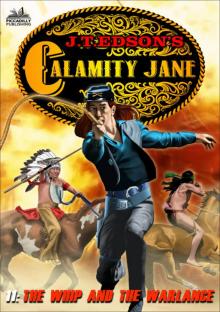 Calamity Jane 11
Calamity Jane 11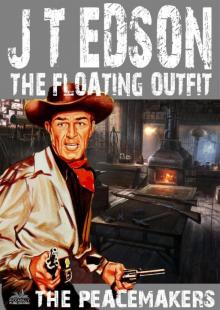 The Floating Outift 33
The Floating Outift 33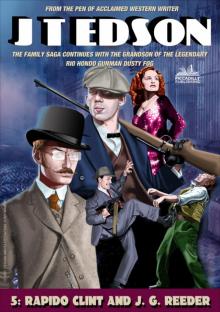 Cap Fog 5
Cap Fog 5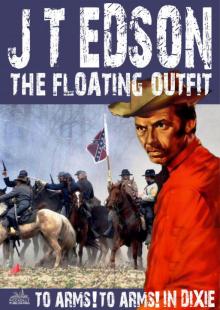 The Floating Outfit 34
The Floating Outfit 34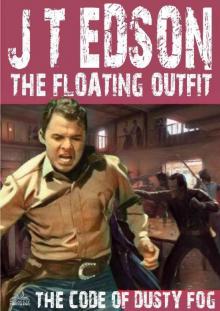 The Code of Dusty Fog
The Code of Dusty Fog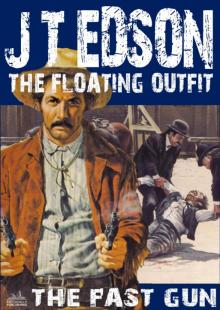 The Floating Outfit 21
The Floating Outfit 21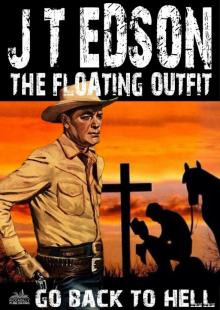 The Floating Outift 36
The Floating Outift 36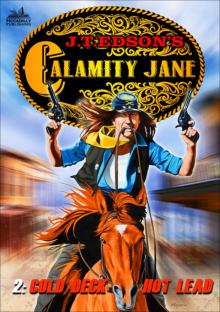 Calamity Jane 2
Calamity Jane 2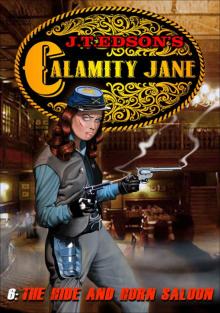 Calamity Jane 6: The Hide and Horn Saloon (A Calamity Jane Western)
Calamity Jane 6: The Hide and Horn Saloon (A Calamity Jane Western)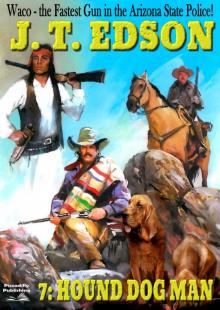 Waco 7
Waco 7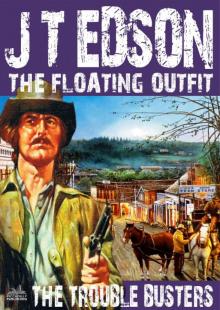 The Floating Outfit 25
The Floating Outfit 25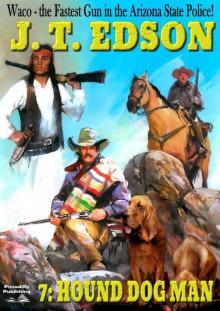 Waco 7: Hound Dog Man (A Waco Western)
Waco 7: Hound Dog Man (A Waco Western)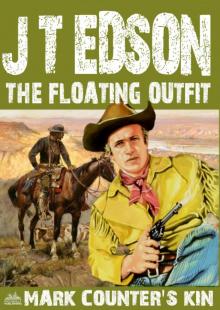 The Floating Outfit 47
The Floating Outfit 47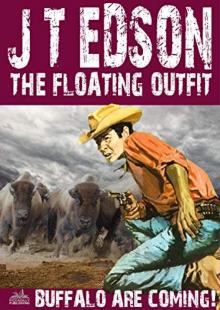 The Floating Outfit 42: Buffalo Are Coming!
The Floating Outfit 42: Buffalo Are Coming!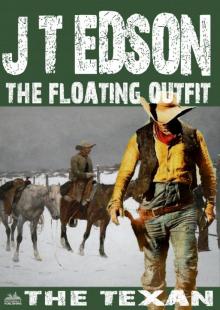 The Floating Outfit 46
The Floating Outfit 46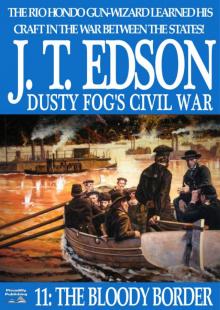 Dusty Fog's Civil War 11
Dusty Fog's Civil War 11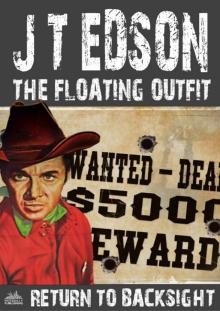 The Floating Outfit 61
The Floating Outfit 61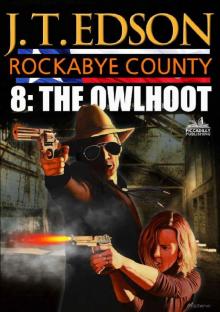 The Owlhoot
The Owlhoot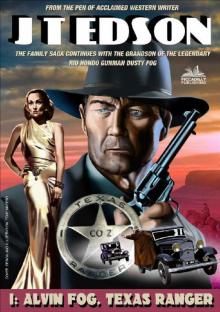 Alvin Fog, Texas Ranger
Alvin Fog, Texas Ranger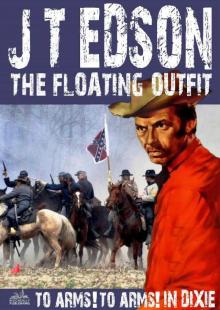 The Floating Outfit 34: To Arms! To Arms! In Dixie! (A Floating Outfit Western)
The Floating Outfit 34: To Arms! To Arms! In Dixie! (A Floating Outfit Western)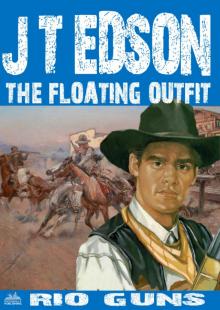 The Floating Outfit 44
The Floating Outfit 44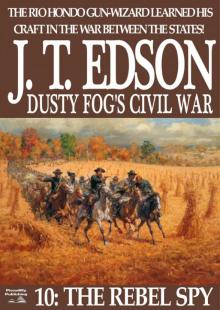 Dusty Fog's Civil War 10
Dusty Fog's Civil War 10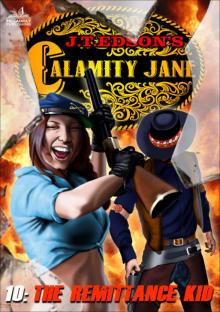 Calamity Jane 10
Calamity Jane 10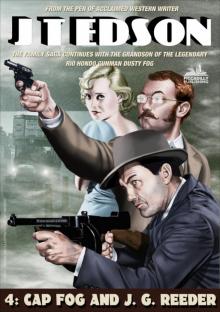 Cap Fog 4
Cap Fog 4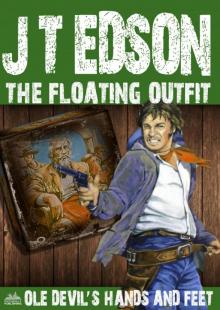 The Floating Outfit 51
The Floating Outfit 51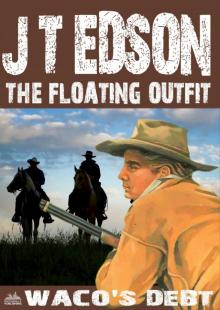 The Floating Outfit 50
The Floating Outfit 50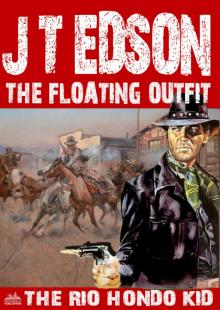 The Floating Outfit 49
The Floating Outfit 49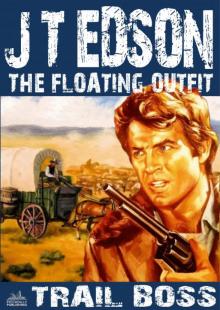 The Floating Outfit 10
The Floating Outfit 10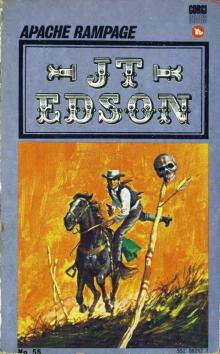 Apache Rampage
Apache Rampage The Floating Outfit 15
The Floating Outfit 15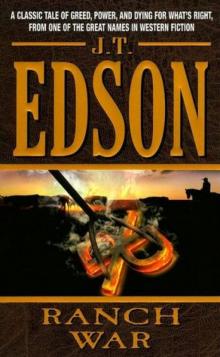 Ranch War
Ranch War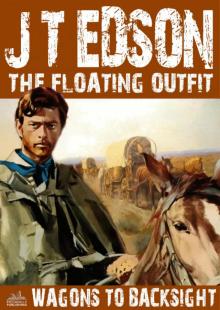 The Floating Outfit 11
The Floating Outfit 11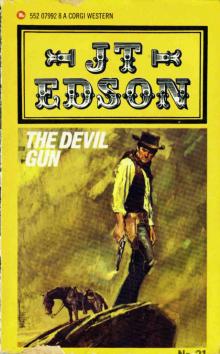 The Devil Gun
The Devil Gun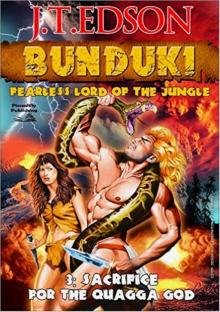 Sacrifice for the Quagga God (A Bunduki Jungle Adventure Book 3)
Sacrifice for the Quagga God (A Bunduki Jungle Adventure Book 3)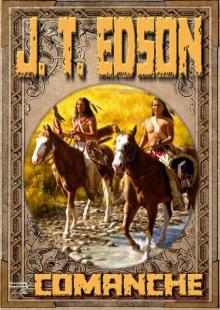 Comanche (A J.T. Edson Western Book 1)
Comanche (A J.T. Edson Western Book 1)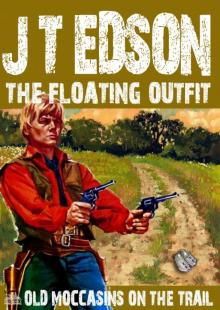 The Floating Outfit 48
The Floating Outfit 48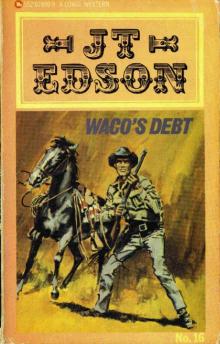 Wacos Debt
Wacos Debt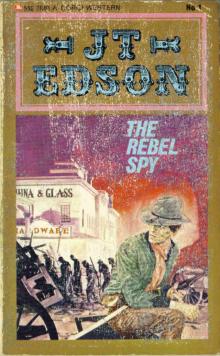 The Rebel Spy
The Rebel Spy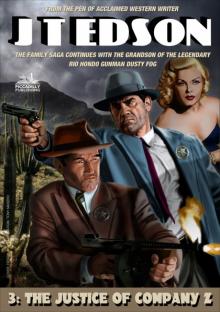 Cap Fog 3
Cap Fog 3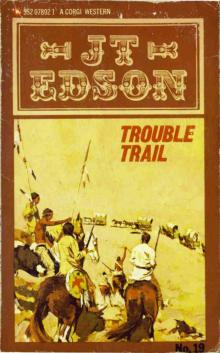 Trouble Trail
Trouble Trail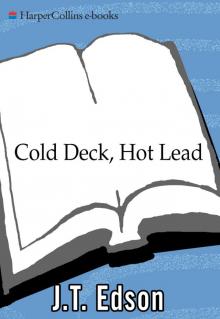 Cold Deck, Hot Lead
Cold Deck, Hot Lead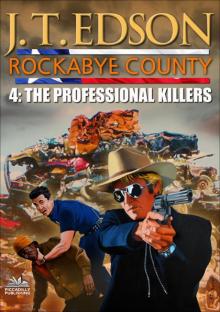 Rockabye County 4
Rockabye County 4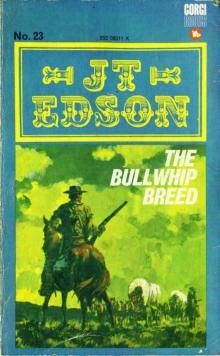 The Bullwhip Breed
The Bullwhip Breed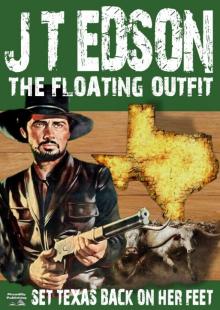 Set Texas Back On Her Feet (A Floating Outfit Western Book 6)
Set Texas Back On Her Feet (A Floating Outfit Western Book 6)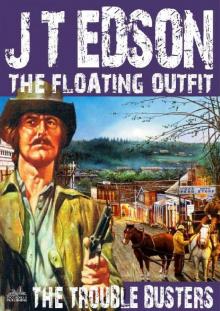 The Floating Outfit 25: The Trouble Busters (A Floating Outfit Western)
The Floating Outfit 25: The Trouble Busters (A Floating Outfit Western)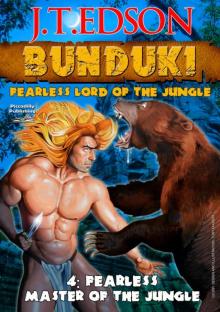 Fearless Master of the Jungle (A Bunduki Jungle Adventure
Fearless Master of the Jungle (A Bunduki Jungle Adventure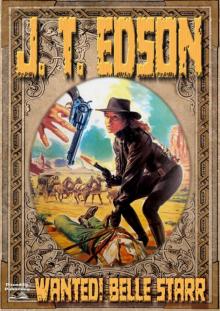 Wanted! Belle Starr!
Wanted! Belle Starr!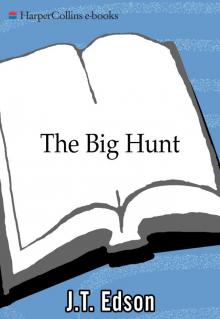 The Big Hunt
The Big Hunt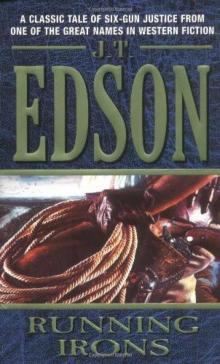 Running Irons
Running Irons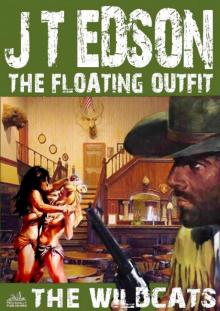 The Floating Outfit 19
The Floating Outfit 19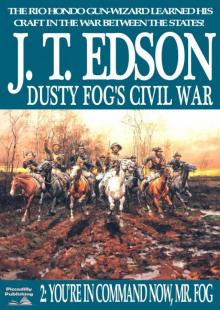 You're in Command Now, Mr Fog
You're in Command Now, Mr Fog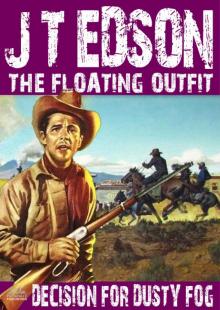 The Floating Outfit 27
The Floating Outfit 27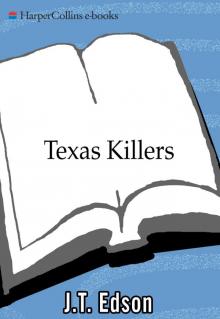 Texas Killers
Texas Killers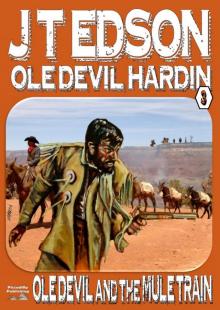 Ole Devil and the Mule Train (An Ole Devil Western Book 3)
Ole Devil and the Mule Train (An Ole Devil Western Book 3)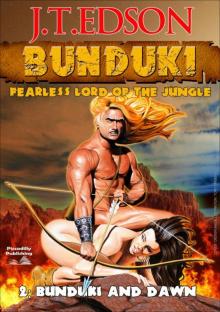 Bunduki and Dawn (A Bunduki Jungle Adventure Book 2)
Bunduki and Dawn (A Bunduki Jungle Adventure Book 2)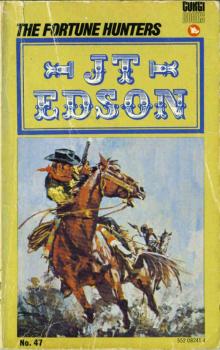 The Fortune Hunters
The Fortune Hunters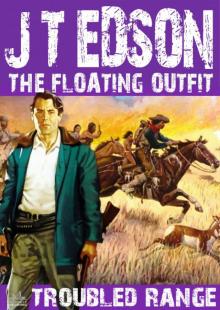 The Floating Outfit 12
The Floating Outfit 12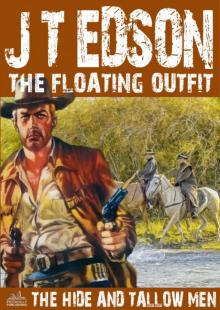 The Hide and Tallow Men (A Floating Outfit Western. Book 7)
The Hide and Tallow Men (A Floating Outfit Western. Book 7)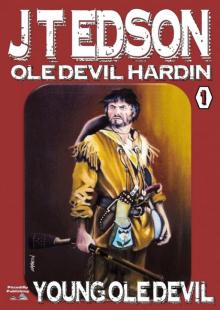 Young Ole Devil
Young Ole Devil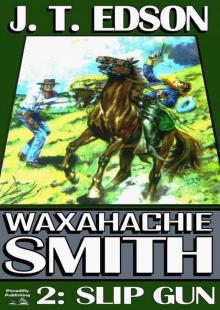 Slip Gun
Slip Gun The Drifter
The Drifter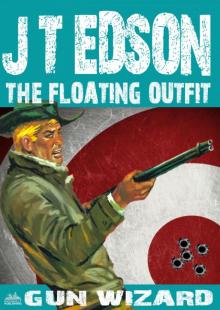 The Floating Outfit 45
The Floating Outfit 45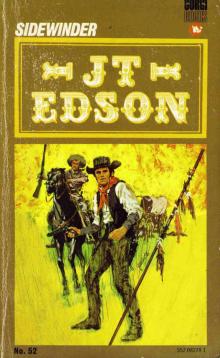 Sidewinder
Sidewinder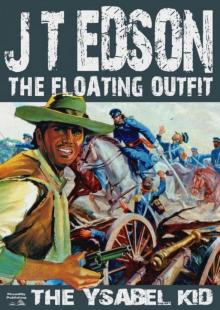 The Ysabel Kid
The Ysabel Kid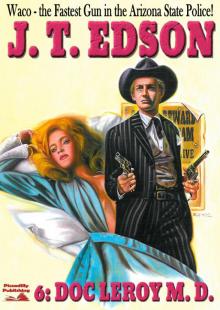 Waco 6
Waco 6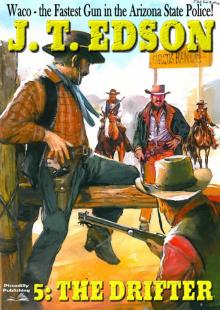 Waco 5
Waco 5 Point of Contact
Point of Contact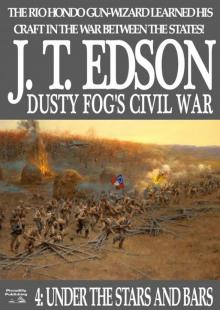 Under the Stars and Bars (A Dusty Fog Civil War Western Book 4)
Under the Stars and Bars (A Dusty Fog Civil War Western Book 4)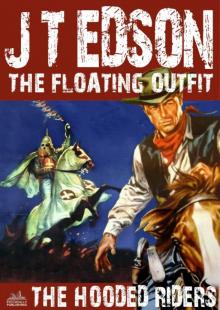 The Floating Outfit 9
The Floating Outfit 9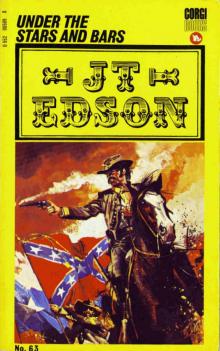 Under the Stars and Bars
Under the Stars and Bars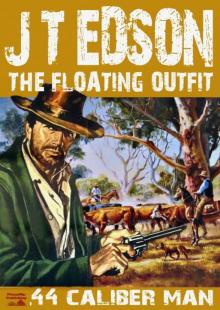 .44 Caliber Man
.44 Caliber Man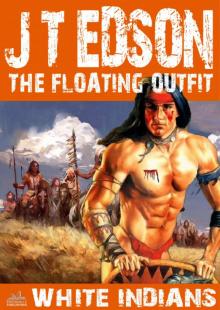 The Floating Outfit 17
The Floating Outfit 17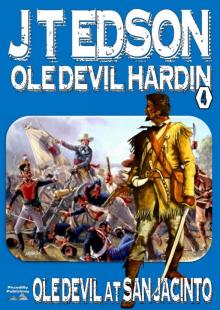 Ole Devil at San Jacinto (Old Devil Hardin Western Book 4)
Ole Devil at San Jacinto (Old Devil Hardin Western Book 4)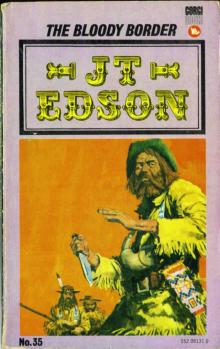 The Bloody Border
The Bloody Border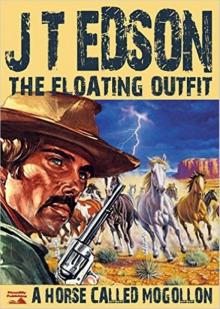 A Horse Called Mogollon (Floating Outfit Book 3)
A Horse Called Mogollon (Floating Outfit Book 3)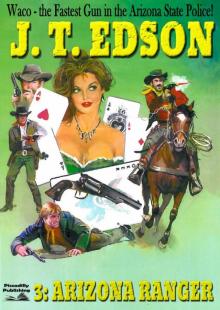 Waco 3
Waco 3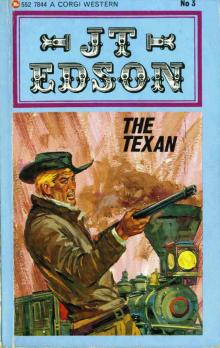 The Texan
The Texan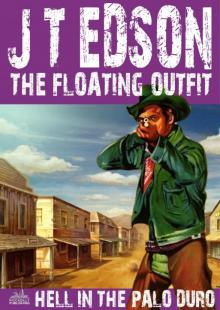 The Floating Outfit 35
The Floating Outfit 35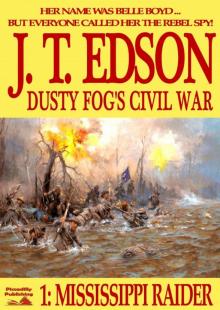 Mississippi Raider
Mississippi Raider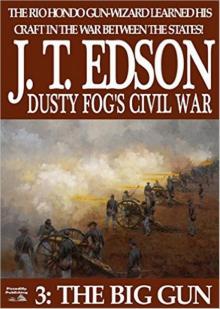 The Big Gun (Dusty Fog's Civil War Book 3)
The Big Gun (Dusty Fog's Civil War Book 3)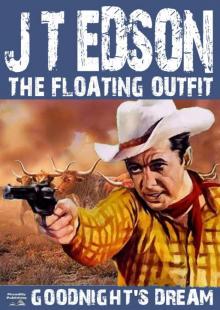 Goodnight's Dream (A Floating Outfit Western Book 4)
Goodnight's Dream (A Floating Outfit Western Book 4) Waco 4
Waco 4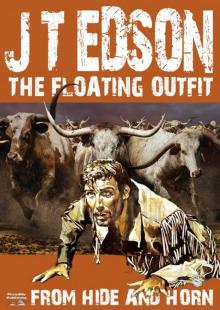 From Hide and Horn (A Floating Outfit Book Number 5)
From Hide and Horn (A Floating Outfit Book Number 5)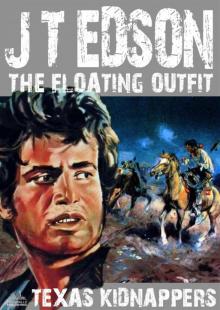 The Floating Outfit 18
The Floating Outfit 18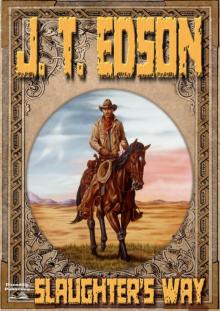 Slaughter's Way (A J.T. Edson Western)
Slaughter's Way (A J.T. Edson Western)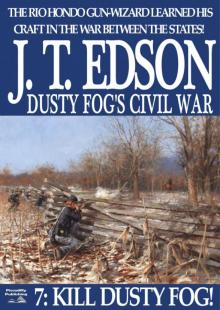 Dusty Fog's Civil War 7
Dusty Fog's Civil War 7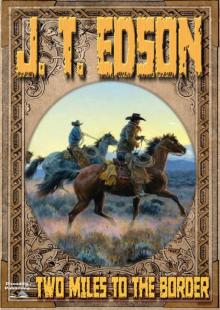 Two Miles to the Border (A J.T. Edson Western)
Two Miles to the Border (A J.T. Edson Western)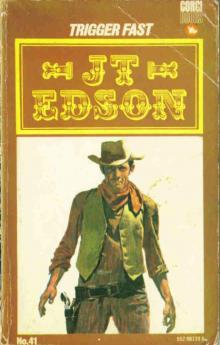 Trigger Fast
Trigger Fast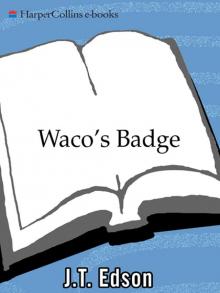 Waco's Badge
Waco's Badge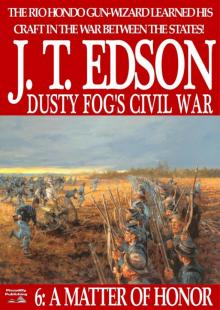 A Matter of Honor (Dusty Fog Civil War Book 6)
A Matter of Honor (Dusty Fog Civil War Book 6)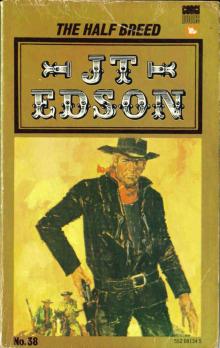 The Half Breed
The Half Breed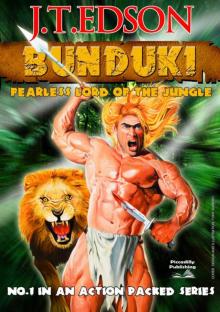 Bunduki (Bunduki Series Book One)
Bunduki (Bunduki Series Book One)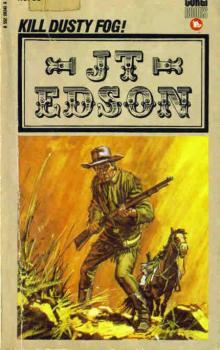 Kill Dusty Fog
Kill Dusty Fog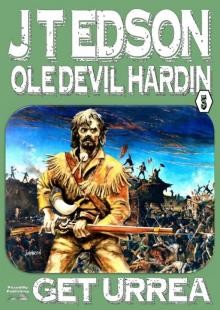 Get Urrea! (An Ole Devil Hardin Western Book 5)
Get Urrea! (An Ole Devil Hardin Western Book 5)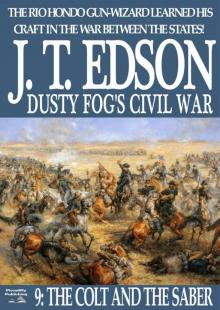 Dusty Fog's Civil War 9
Dusty Fog's Civil War 9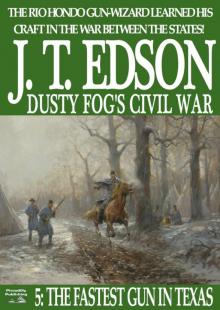 The Fastest Gun in Texas (A Dusty Fog Civil War Book 5)
The Fastest Gun in Texas (A Dusty Fog Civil War Book 5)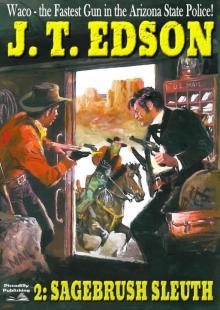 Sagebrush Sleuth (A Waco Western #2)
Sagebrush Sleuth (A Waco Western #2)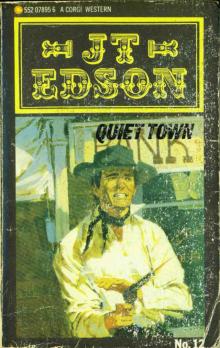 Quiet Town
Quiet Town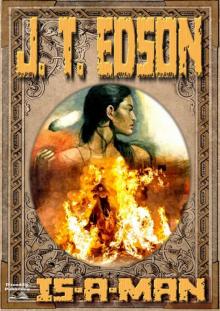 Is-A-Man (A J.T. Edson Standalone Western)
Is-A-Man (A J.T. Edson Standalone Western)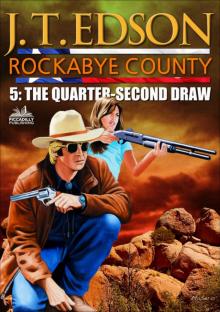 Rockabye County 5
Rockabye County 5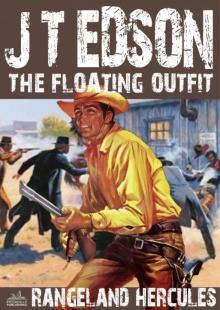 The Floating Outfit 14
The Floating Outfit 14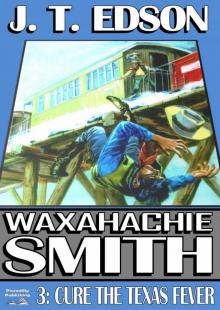 Cure the Texas Fever (A Waxahachie Smith Western--Book 3)
Cure the Texas Fever (A Waxahachie Smith Western--Book 3)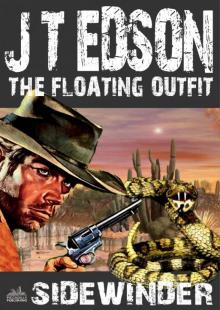 The Floating Outfit 13
The Floating Outfit 13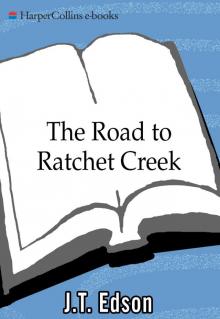 The Road to Ratchet Creek
The Road to Ratchet Creek